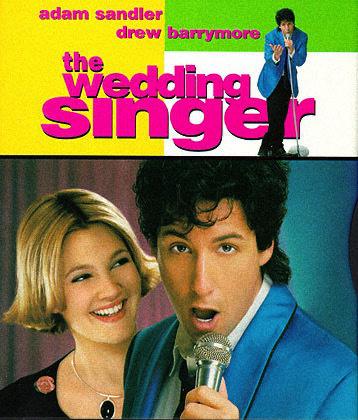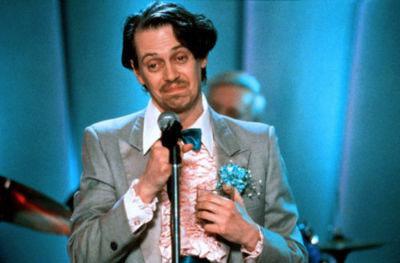
I am a sucker for romantic comedies. I am not alone. Americans have loved romantic film comedies for just short of 100 years now with an unparalleled degree of passion and even zealotry. I am a zealot. What else could explain my love of The Wedding Singer? OK, that's a cheap shot at the film just for a rhetorical joke. I regret it already, so I will confess a simple fact: I love The Wedding Singer and without hesitation will defend it as Adam Sandler's best comic performance. OK, even as I type this I realize that such an assertion could be taken ironically or as a shot at Sandler. Once such jokes start, they are hard to stop. The truth is simple, though: I will watch The Wedding Singer and enjoy it any chance I get. The Steve Buscemi cameo alone makes it time well spent. Take a moment with it: Steve Buscemi in The Wedding Singer
Back to the popularity of romantic comedy. Go ahead and do a Google search for "popularity of romantic comedies": 7,280,000 hits. That is a scientifically irrefutable testament to their cultural centrality. Just to seal the point with a point of comparison, a control group of sort for popularity: type in "popularity of Taylor Swift" and you will get 592,000 hits. That's a large response but paltry compared to the rom-com, even though Swift's music is in its own way a celebrant of romantic comedy. One more, in case you are not convinced: type in "popularity of Kanye West": 545,000 (and trending downward), another win for Taylor Swift! But we are way off the point that I want to make here, which is this: romantic film comedies are crucial to the survival of the United States.
And they are in trouble.
The popularity, though many academics pretend not to understand it, is quite simple. The formula affirms basic human desires for-get this-happiness. Imagine that. This desire is especially central American culture since we inculcate the core aspiration (expectation) of happiness in our founding political and social ideology: the pursuit of happiness as an essential right. The romantic comedy simply affirms that happiness can be attained via love balanced with good-hearted laughter. The combination is perfect and whereas it leads to repetition and convention, so does life itself. Have you noticed?
We remain keenly interested in artistic expressions that celebrate love and laughter. The wonderful minds at Cracked have given us a fine discussion on the romantic comedy as form and cultural statement. The formula is indeed vulnerable to parody and mockery. Here is one of the most astute skewering of romantic comedy formula that also, in its own way, affirms the human desire it offers audiences: from Cracked, After Hours, on rom-com formula
The romantic comedy as an art form is yet again under attack. Plenty of people dismiss the predictable formula and the sheer repetitiveness, and, supposed schmaltz of romantic comedy films. That has always been the case, even as multitudes of moviegoers have supported that formula generation after generations.
No other form of popular artistic expression comes close to capturing the absurd vagaries of life on this planet while also maintaining a desire among its audience to continue living and laughing. Cynical ironists, however remarkably clever, always ignore the second but crucial component of the preceding point: humans generally want to be happy on some level. A human willingness to observe the "absurd vagaries of life," as I put it, rarely comes with any desire to stop believing in the potential to be happy. Thus a paradox, of sorts. On the one hand, there is the human recognition of the Void (the stuff of nihilism, postmodernism, and T he Family Guy); on the other hand, there is the human belief in two related expressions that reject the implications of that recognition: love and laughter. Romantic comedies, as the name impliles, bring those two wonderful human aspirations together. In the United States, that combination resonates like no other, and we cannot lose that advantage.
Only one definitive component of American cultural identity really matters: the push to pursue happiness. All else comes from that cultural imperative, all of our comedy and all of our romantic dreams. It is farce and inspiration all wrapped together. And the energy built from that vortex of tension makes for a vibrant comedic landscape. But American humor must always depend on the expectation of romantic celebration that we will live happily ever after. If that bothers you, go look in a mirror and say, "I am a tedious bore," and leave romantic comedies alone.
Although many critics would like to downplay the resonance of romantic comedies, until recently, they have remained a formidable position in our comedic and romantic cultural heritage. As indicated above, any casual search for the popularity of romantic comedies yields a wealth of responses. The lists of the best rom-coms alone are compelling.
For example, see "The Most Popular Romance-Comedy Feature Films With At Least 10,000 Votes"- Most Popular Romantic Comedies
Or this: Top Romantic Comedies at the Box Office
The biggest challenge to the continued importance of romantic comedy to the preeminence of the United States as a political and social superpower is money. The current landscape for rom-coms in Hollywood is bleak. It seems many feel that the long, profitable run of rom-coms is over. See for example, the following: "R.I.P. Romantic Comedies: Why Harry Wouldn't Meet Sally in 2013," by Tatiana Siegel (9/26/2013). Here is a link to the article from Hollywood Reporter: RIP Romantic Comedy
Another substantive article follows the same issue: "Who Killed the Romantic Comedy?" by Amy Nicholson (Feb 27, 2014). Here is a link to the article from LA Weekly: Who Killed the Romantic Comedy
Both articles assert that the romantic comedy is in a death spiral, or sorts, and note a variety of issues that are challenging the form as a business enterprise. Of course, one reason seems to be a changing social climate that no longer responds to the formula. According to Nicholson, "Men and women are still falling in love, of course. They're just not doing it on screen - and if they do, it's no laughing matter. In today's comedies, they're either casually hooking up or already married. These are comedies of exasperation, not infatuation." Though I am skeptical as to the cultural dynamics that influence genre formulas are somehow more cynical now than at any other decade, the point may carry weight moving forward if the trend persists. If young people reject the premise of romantic comedy as a form for affirming both romantic and comedic dreams, we may be in trouble.
It may be more market driven and the perverse effects of social media culture, and the bizarre and stunted relationships that derive from it. Snap Chat me! More practically, the results may come from an industry addicted to franchising, or "sequelization." Action/superhero films are primed to benefit from such a climate. How many Transformers can there be? - Don't ask. Romantic comedies, however, cannot participate in such a production model. Nicholson puts it succinctly: "Romantic comedies don't launch franchises. Where do you go after a happy ending?"
Indeed, despite its detractors who claim to hate the happy ending so crucial to romantic comedy formula, it is not artistic integrity or creativity that is currently damning the rom-com; rather it is the business model that too often rejects any ending at all.
Nicholson also notes the effects of foreign markets on the romantic comedy. She writes, "In 2001, the international box office was 51 percent of total movie sales. Ten years later, it was 69 percent, and it continues to climb. The common wisdom is that international audiences shun romantic comedies - they're too wordy and culturally specific. If you want to sell abroad, make a cartoon or an action spectacular." I am not sure I buy that (I've seen Amelie and Cinema Paradiso).
Even if this is partially correct, the answer is to keep pushing the formula. If America is being sold abroad with its films, for the love of all things positive in our culture, we cannot cede the ground wholly to the action adventure genre.
Audiences, despite the simplicity of the formula (or because of it), watch rom-coms with an implicit sense of modeling the behavior on screen. That goes for domestic and foreign audiences. An interesting article on this behavior considers the effects or the implied intimacy viewers share with romantic comedies on the whole. An issue of Communication Currents (August 2013), offers an interesting look at the relationship between romantic comedies and viewers. See: Watching Romantic Comedies. In "It's Not What Romantic Comedies You Watch, But Why You Watch That Really Matters," the authors, Hefner and Wilson, note "that repeated viewing of romantic comedies could encourage viewers to think of their own relational partners as wonderful and perfect, which previous research has demonstrated can have a positive impact on relational functioning."
Idealism is not such a bad thing for reality. Romance is affirming and it draws out a complementary affirmation from comedy. And that combination makes America a formidable cultural power more than any other. We should all embrace it. If doing so extends the careers of Adam Sandler and Drew Barrymore, all the better. Come on, Hollywood, green light more rom-coms and give the writers the chance to rejuvenate the genre. And let's hope we are all ready to watch again.
Many folks hate the idealism-real or implied or inferred-that permeates romantic comedies. I am old enough to tell the truth: such people are tiresome. I only wish I could stand outside their homes, boom box hoisted over my head and blaring out anything by Taylor Swift. Comedic gold, romantic gold. It makes me happy just to think about it, which is the point of romantic comedies in the end. I love them for it.

